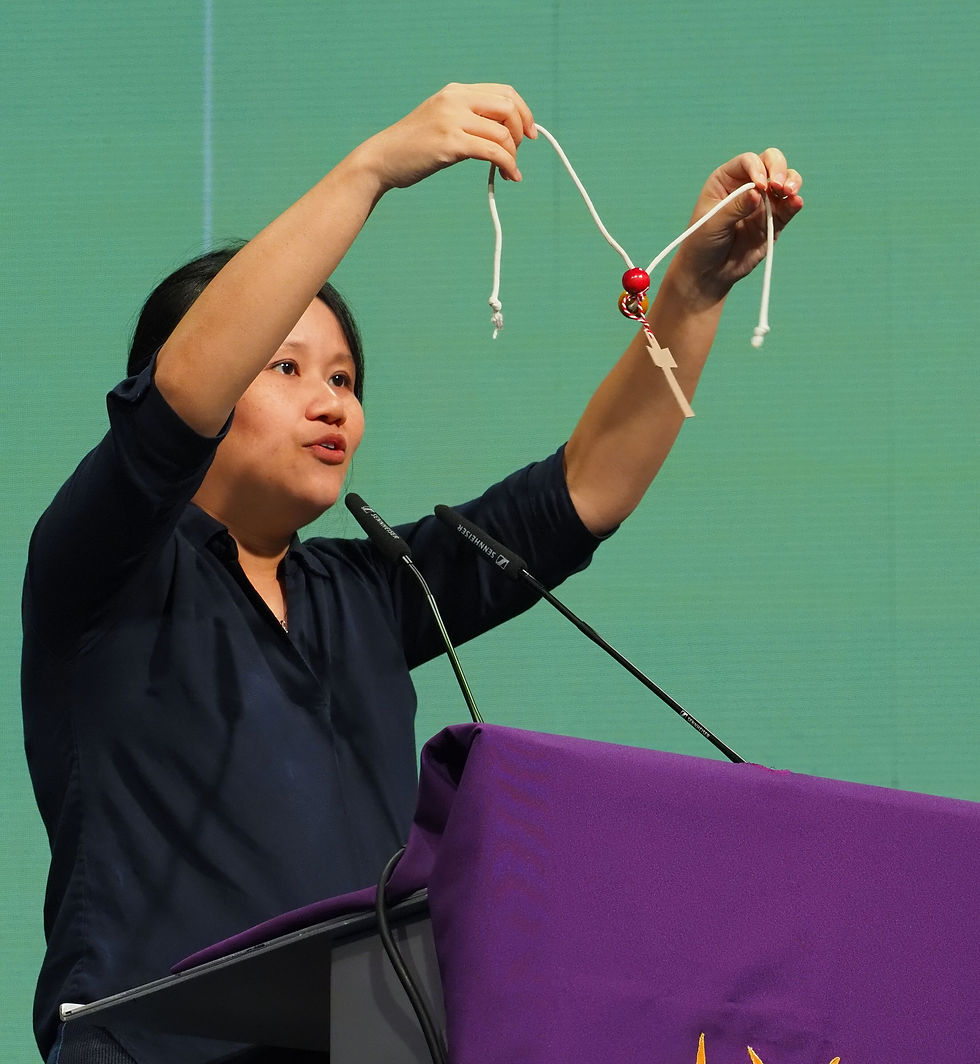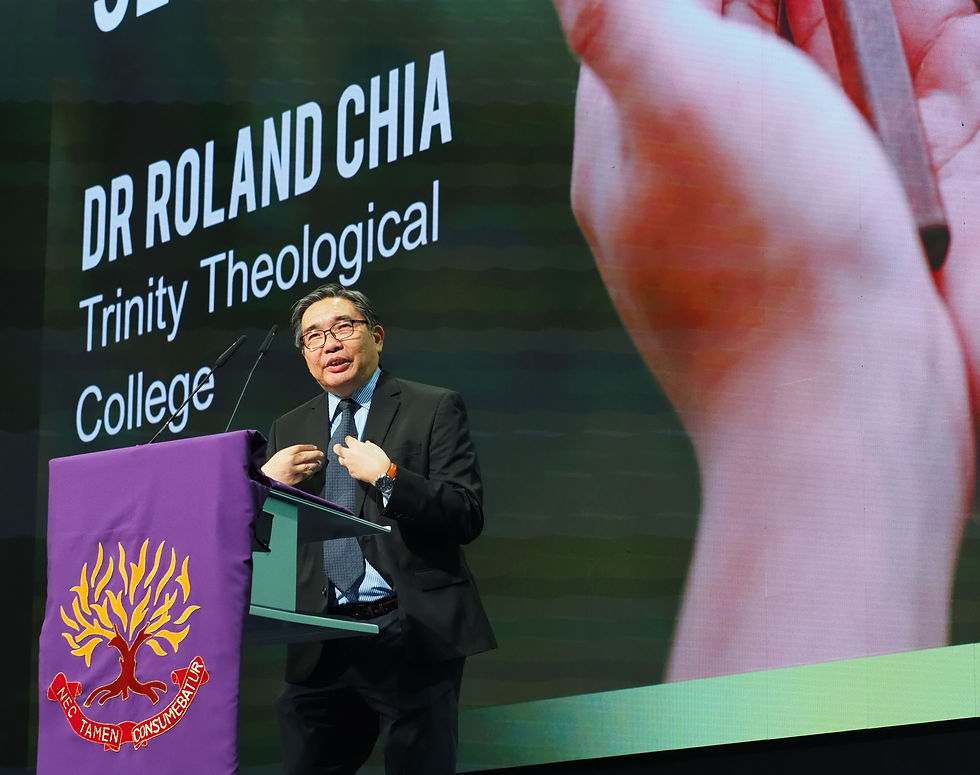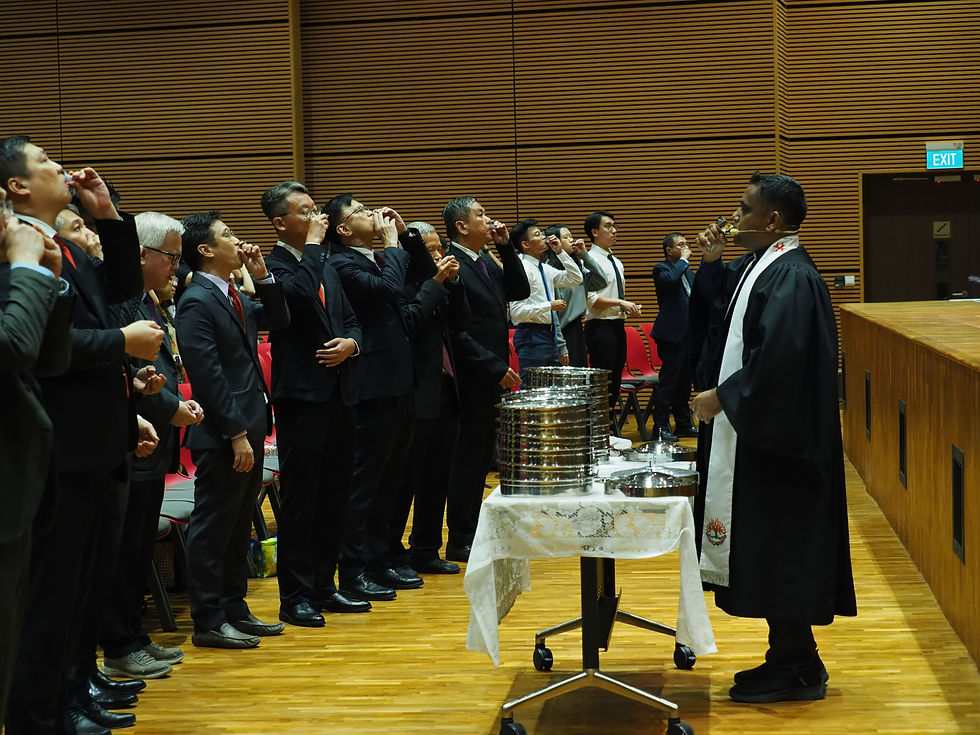EP Holy Week Convention (16 - 18 April)
- Rev Kelvin Chen
- Jul 19, 2025
- 6 min read
We praise God for the privilege to gather once again as a Presbytery family to reflect on and commemorate the sacrificial death of our Lord, Jesus Christ.

This year, Adam Road Presbyterian Church @Tengah warmly hosted us for the first two days of the 3-day convention, on 16 & 17 April. We are grateful!
We are also thankful for the worship teams from Toong Chai English Presbyterian Church (TCEPC) (who led us in worship on the first night (16 Apr)), Ang Mo Kio Presbyterian Church (AMKPC) (who led us on the 2nd night (17 Apr)), and Prinsep Street Presbyterian Church (PSPC) (who led us in worship on Good Friday (18 Apr)). We are grateful for the worship teams who were well prepared, and led us through God’s Spirit, to prepare our hearts to receive and respond to God’s Word. Thank you very much, TCEPC, AMKPC, and PSPC!
We are also appreciative of all the churches who sent their volunteers to serve the wider EP family in various capacities. Thank you, volunteers!
The attendances for the 3-day convention were as follows:
Attendance | Onsite | Online |
16 April | 420 | 2.1k |
17 April | 532 | 1.4k |
18 April | 3500 | 1.3k |

At the Good Friday service, Pr Elena Yeo from Amazing Grace Presbyterian Church gave an engaging sermonette to the children, encouraging our children to remember the marvellous salvific story of cross. She began right at the beginning, with reference through the creation narrative, using a “magic trick”, to visually teach the gospel, illustrating the fall of man, resultant separation from God because of sin, and God’s provision of salvation through the perfect life, death and resurrection of Christ Jesus our Lord.
If you want to show Pr Elena’s sermonette to your children or grandchildren again, you can find it on the EP Holy Week Convention website, https://epholyweekconvention.org/#sermon.

For each day of the convention, Dr Roland Chia, Chew Hock Hin Professor of Christian Doctrine at Trinity Theological College brought us the sermon, based on the theme “The Meaning of the Cross”, with three reflections directed at the Cross of Christ, with the common fundamental question, “What is the meaning of the death of Jesus on the Cross? What is its significance?”
Wednesday 16 April: The Revelation of the Cross (Romans 5:8)
The Cross reveals the depth of our human fallenness and sinfulness, as Paul stressed, “for all have sinned and fall short of the glory of God” (Romans 3:23). The Cross is not only something God has done for us, to save us – the Cross is also something done by us. We are responsible for the death of Jesus on Calvary’s Cross – not just the Jews, not just the Roman soldiers. We are responsible because we are wretched and hopeless sinners. Which is the doctrine of total depravity, which stresses that every aspect of the human person has been tainted by sin.
The Cross also reveals who God is: the immeasurable depth of God’s love, which is both proactive and unconditional. God sent His Son to die for us, “while we were still sinners” (Romans 5:8). His love is freely offered and not contingent on human performance. His love is sacrificial and self-giving. “For God so loved the world that he gave his only Son, that whoever believes in him shall not perish but have eternal life” (John 3:16).

The Cross also reveals how God saves us – unveiling the way to salvation. Elaborating on the doctrine of “penal substitution” – Dr Roland emphatically reminded us, that on the Cross, Christ died in the place of us sinners, bearing the punishment that we all deserve. “For our sake He (God) made Him (Christ) to be sin who knew no sin, so that in Him (Christ) we might become the righteousness of God.” (2 Corinthians 5:41)
Maundy Thursday 17 April: The Victory of the Cross (Colossians 2:15)
When people look at the innocent Jesus on the Cross, they do not immediately see a victor. Yet the theme of victory on the Cross, resonates throughout the New Testament. Paul declares in his letter to the Corinthian church, ‘Thanks be to God, who gives us victory through our Lord Jesus Christ’ (1 Corinthians 15:57).
Because of Christ’s death on the Cross – we have victory over sin. Despite the seriousness of sin – rebellion against God, despite the serious consequences of sin – physical and spiritual death, Christ triumphed over sin through His death on the Cross. Those who put their faith in Christ are set free from sin’s dominion over their lives.
Because of Christ’s death on the Cross – we have victory over death. As 1 Corinthians 15:22 states: “For as in Adam all die, so also in Christ shall we be made alive”. As Calvin writes in the Institutes of the Christian Religion:
[Christ] endured death, not only that he might satisfy the just judgement of God, but also that he might obtain victory for us over death.
Thus, unlike those without Christ who despair of death, Christians should never fear death – because death does not have the final word.
Because of Christ’s death on the Cross – we have victory over Satan and his minions. We have confidence in this assertion because the Bible declares: “And having disarmed the powers and authorities, he made a public spectacle of them, triumphing over them by the Cross.” (Colossians 2:15) And to drive the point – Dr Roland reminded us of Scottish preacher and theologian, Alexander Maclaren’s comment on Colossians 2:15, as presenting a unified picture of Christ as:
the victor stripping his foes of arms and ornaments and dress, then parading them as his captives, and then dragging them at the wheels of his triumphal car.
As we live in the “already but not yet”, we are encouraged to persevere in faith and hope, anticipating the certainty of a future promised, but yet to be fulfilled, as promised in Revelation 21:3 – 4.
Good Friday 18 April: The Challenge of the Cross (Matthew 16:24 - 26)
In the Christian faith, the Cross presents a profound paradox – it is at once both a symbol of death, and a symbol of life. The Cross was a brutal, shameful method of Roman execution, yet for Christians it is the source of eternal life.
Matthew 16:24 – 26 issues a radical challenge to all believers: like the Cross itself, discipleship embodies a paradox. Just as the Cross symbolizes both death and life; so Christian discipleship calls us to die to ourselves, and live for Christ.
The first step in following Jesus our Lord is self-denial. Self-denial requires a radical shift in our priorities and our posture towards ourselves – our perspectives and our priorities, our desires, motivations and ambitions. It is to dethrone the self-centred desires and aspirations that dominate our hearts.
But self-denial is never an end in itself: it is always a means to a greater purpose, that is, for us to live our lives in total surrender to God.

The next step is to take up our crosses daily in order to follow Christ. Suffering and even death were not negotiable for Christ, because this was part and parcel of His salvific mission: and in verse 24, Jesus made it clear that those who wish to be His disciples must be prepared to do the same.
What does this mean for us disciples who live in relatively free and peaceful Singapore? At the least it challenges us to be mindful of the seductive lure of comfort and convenience that can lead us into spiritual slothfulness and complacency. We are called to be mindful of how the pursuit of material wealth and personal success can erode our spiritual fervour and thus lead to a faith that is lukewarm and disengaged. Would we choose obedience even if we might lose our jobs and social status as a result?
And finally, we are called to follow Jesus.
As we reflect on Matthew 16:24 – 26, we are challenged, that we cannot follow Jesus unless we first deny ourselves and take up our cross. John Stott explains in his book Basic Christianity, ‘To confess Jesus as Lord’, Stott writes, ‘is to pledge ourselves to submit to him, to obey him, and to live a life that reflects his authority’.
We are disciples of Christ only when we submit to His lordship in every, single area of our lives. As our Lord Himself warned in Matthew 7:21 – 23:
Not everyone who says to me, ‘Lord, Lord’, will enter the kingdom of heaven, but only the one who does the will of my Father in heaven. On that day many will say to me, ‘Lord, Lord, did we not prophesy in your name, and cast out demons in your name, and do many mighty works in your name?’ And then will I declare to them, ‘I never knew you; depart from me, you evildoers.

Through the Cross, Jesus Christ bore the weight of our sin and shame, offering us the gift of salvation and eternal life. Yet, the Cross calls us to a life of radical discipleship – a life marked by self-denial, cross-bearing and wholehearted obedience to Christ.
As we live our lives in this “already but not yet”, may the Lord fill us with hope, as we walk in the power of His victory, living as people redeemed, transformed, and utter belonging to Jesus our Lord. Amen.
If you want to revisit Dr Roland Chia’s three sermons, you can find them on the EP Holy Week Convention website, https://epholyweekconvention.org/#sermon.
On behalf of EP Holy Week Convention Committee
Rev Kelvin Chen
PSPC




Comments